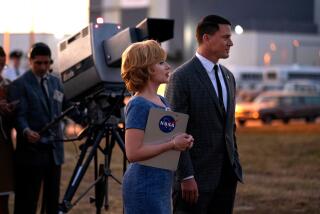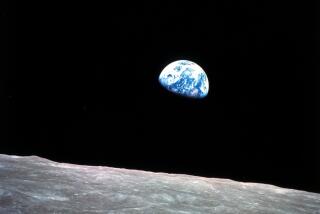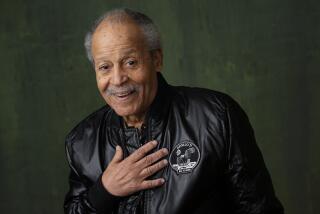The Candle He Lit Illuminated Our Pathway to Space
- Share via
I don’t remember much about 1961.
I couldn’t tell you where I was when East Germany’s authorities closed the border to West Berlin. Or when an invasion of the Bay of Pigs left the U.S. with a real mess.
I have no vivid memory of JFK’s inauguration day, or of watching baseballs being hit over fences by Roger Maris and Mickey Mantle.
But something happened on May 5 of that year that would stick with me for most of my life.
Alan Shepard flew into space.
A man, not a monkey, got strapped into a capsule that resembled a Volkswagen and sat there waiting to be launched, while Americans held their breath, many of them listening to radios in cars that they pulled off to the side of the road.
“Light this candle!” Shepard told the boys in the control room, borrowing a pet phrase of Chuck Yeager’s.
And up he went.
For a child of that era, it was like watching Flash Gordon blast off. Virtually overnight, it no longer seemed enough to grow up and become a soldier, a singer or a slugger of baseballs. A new profession existed now: astronaut.
No kid anywhere--Alan Shepard included-- had ever grown up wanting to be an astronaut.
I wonder how many do now.
*
A journalist and his wife once had lunch with Neil Armstrong, who asked most of the questions. Armstrong kept inquiring about the couple’s many trips to exotic places.
“Mr. Armstrong,” the journalist’s wife finally said, “you’ve walked on the moon. We want to hear about your travels.”
“But that’s the only place I’ve ever been,” Armstrong replied.
The astronauts we remember most now are Armstrong, our original moonwalker, and John Glenn, the first American in orbit.
Buzz Aldrin also remains rather famous, and Jim Lovell’s dilemma aboard Apollo 13 has been immortalized on film.
Why we neglected Alan Shepard, who died last week, I’ll never know.
He had a literal 15 minutes of fame. That’s how long our first manned space flight took, before Shepard’s capsule splashed down 40 miles off the coast of Bermuda.
I can remember that experience as though it happened last Sunday. We only had three or four channels on our TV that worked, and I think we switched back and forth to all of them. I mainly remember the delay, the four hours they kept the launch on hold. That was agonizing.
It turned out that it was a lot worse for Shepard, not because he was nervous, but because the rocket scientists had forgotten to give him a means of going to the bathroom.
None of us heard the words on TV when Shepard was given the go-ahead to “do it in your suit.”
There were a lot of things we didn’t know about our Mercury astronauts, except what we had been spoon-fed by Life magazine.
It was only much later, thanks to author Tom Wolfe and others, that we learned more about Alan Shepard, the Navy commander who was chosen over Glenn and five others to be our first man in space.
That he never flew in combat, as Glenn had. That he drove a Corvette, naturally, and frequently needled Glenn about loosening up and selling that pokey old Peugeot of his. That he called Glenn “way out of line” for suggesting to the astronauts that their social lives were becoming a little too active.
On launch day, though, Glenn good-naturedly put a sign inside Shepard’s capsule. It read: NO HANDBALL PLAYING IN THIS AREA.
That was Glenn’s idea of a joke. Shepard was to do crude impersonations of a Bill Dana character called Jose Jimenez, but we were better off not knowing that at the time.
We just wanted to see him go up.
Then wanted to see him come down.
*
A day after his flight, JFK presented him a Distinguished Service Medal in the Rose Garden, and a day after that, Shepard rode in a ticker-tape parade down Broadway.
He was largely overlooked thereafter, though, except for a mission to the moon, where he pulled out a golf club and played a lie a lot rougher than anything at Riviera.
Glenn wants to go up again. Quoting Shakespeare, he says, “Our doubts are traitors, and make us lose the good we oft might win by fearing to attempt.” (“Measure for Measure,” Act I, Scene 4.)
Shepard showed the way. It would be nice if the next person in space could light a candle for him.
Mike Downey’s column appears Sundays, Wednesdays and Fridays. Write to him at Times Mirror Square, Los Angeles 90053, or phone (213) 237-7366.
More to Read
Sign up for Essential California
The most important California stories and recommendations in your inbox every morning.
You may occasionally receive promotional content from the Los Angeles Times.













